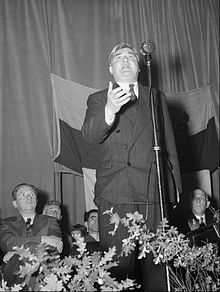Aneurin Bevan

Aneurin Bevan , better known as Nye Bevan , (born November 15, 1897 in Tredegar , Monmouthshire , Wales , † July 6, 1960 in London ) was a British politician of the Welsh Labor Party . As a minister, he pushed through the British National Health Service .
origin
Aneurin Bevan came from a mining family in Wales. His father as a Baptist and his mother as a Methodist belonged to religious communities that differed from the Anglican state church . He was a member of the Liberal Party in his youth . However, inspired by the socialist writings of Robert Blatchford , he resigned from the party and became a member of the Independent Labor Party . From the 1930s onwards he was one of the few Labor MPs permanently represented in parliament. In 1930 he sympathized with Oswald Mosley's New Party Manifesto . The later fascist leader was still part of the Labor environment and had argued in favor of founding a party. In 1939 Bevan was expelled from the Labor Party at short notice because of his sympathy for the Popular Front.
In 1934 he married the Scottish lower house MPs Jennie Lee .
MP and Minister
During the Second World War, Bevan's speech in the House of Commons became famous in which he linked a defeat of Field Marshal Claude Auchinleck in the African War with British class society. Bevan accused the British military of using military talents such as the Spanish fighter Michael Dunbar, who as a staff officer of the republic troops on the Ebro had commanded 150,000 men, only as a non-commissioned officer; Everyone would know that the (equally non-aristocratic) German General Rommel, as a Briton, would not have got beyond the status of a sergeant.
When the Labor Party formed government in 1945, he became Minister of Health and Housing. In view of the destruction caused by the war, the youngest member of the Attlee cabinet had the most difficult tasks. The National Health Service Act passed on July 5, 1948, which guarantees British citizens basic health care covered by taxes, is attributable to him. He had prevailed against critics from various camps in a dispute that lasted for years; not only bourgeois circles but also the left-wing liberal Guardian rejected the project sharply and vehemently demanded his resignation. Bevan rejected British rearmament after the war and therefore resigned from the government. Subsequently, members of the left wing of the Labor Party were referred to as Bevanites. Some of his supporters distanced themselves from him when he gave up his opposition to British nuclear armament after 1957.
heritage
Bevan was known for his verbal failures. In 1948, for example, he referred to members of the Tories as "vermin" (vermin) - the saying led to the establishment of the Vermin Club , a group of committed campaigners from humble backgrounds within the Tories, who later joined Margaret Thatcher, among others. Bevan is still considered a folk hero because of his charismatic personality, his contributions to the welfare state and his roots in Wales and was voted first on the list of the 100 Welsh Heroes in 2004.
literature
- Nicklaus Thomas-Symonds : Nye: The Political Life of Anerin Bevan . London: IB Tauris, 2014 ISBN 978-1780762098 (not used here)
Web links
- Literature by and about Aneurin Bevan in the catalog of the German National Library
- Newspaper article about Aneurin Bevan in the 20th century press kit of the ZBW - Leibniz Information Center for Economics .
- Aneurin Bevan im Hansard (English)
Individual evidence
- ↑ History of James Ramsey MacDonald - GOV.UK . Retrieved April 25, 2015.
- ↑ Leader: Time for change? . In: The Manchester Guardian , October 22, 1951.
- ^ David Kynaston : Austerity Britain 1945–1951 . Bloomsbury, London 2007, ISBN 978-0-7475-9923-4 , p. 285.
- ^ Peter Dorey: The Labor Governments 1964–1970 . Taylor & Francis, 2004, p. 12.
- ↑ Enduring legacy of Aneurin Bevan . In: BBC . July 6, 2010 ( bbc.co.uk [accessed May 23, 2015]).
| personal data | |
|---|---|
| SURNAME | Bevan, aneurin |
| BRIEF DESCRIPTION | British politician |
| DATE OF BIRTH | November 15, 1897 |
| PLACE OF BIRTH | Tredegar , Monmouthshire , Wales |
| DATE OF DEATH | July 6, 1960 |
| Place of death | London |
